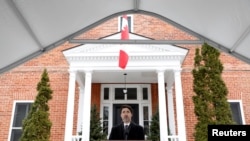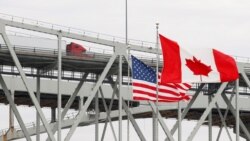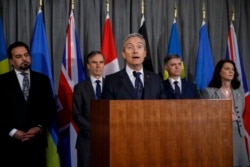The United States and Canada are closing their borders to “to all nonessential traffic,” U.S. President Donald Trump and Canadian Prime Minister Justin Trudeau announced Wednesday. Trump tweeted that the decision was reached “by mutual consent.”
The announcement comes as countries around the world ramp up measures to shield their citizens from COVID-19, which was first reported in Wuhan, China.
Earlier, Trump’s decision to stop European Union visitors from traveling to the United States was condemned by the EU on the grounds that it was done unilaterally and without prior consultation.
Trump and Trudeau made clear the border closing would not affect bilateral trade or the U.S.-Mexico-Canada trade agreement, which was ratified in Canada last week. The treaty, an update of the North American Free Trade Agreement, known as NAFTA, had been ratified earlier in the U.S. and Mexico.
'We’re family'
Before the border closed, over 400,000 people traveled between the two countries “every single day,” Acting Ambassador of Canada to the United States Kirsten Hillman told VOA. Daily cross-border trade, she said, totaled $2.5 billion.
As she sees it, “We’re more than neighbors, more than allies for defense and security purposes. We’re partners, but we’re family – sometimes figuratively, often literally.”
Speaking about the trade agreement passed by the Canadian Parliament last week, Hillman described the trilateral trade agreement, known in Canada as CUSMA, as “critical to the long-term stability and predictability of Canada-U.S. relations.”
“It is a high-standard agreement that promotes shared prosperity for our workers, farmers and businesses,” Hillman stated, adding that “new provisions, such as the auto rules of origin, will encourage production and sourcing within the U.S. and North America in general.”
The Canadian envoy also said that helping strengthen middle-class individuals and families in both countries, creating good, well-paying jobs, is a crucial component of the trade deal.
Passage of the legislation in Canada, known as C-4, required that certain Canadian laws and regulations be amended to conform with the country's obligations under the agreement.
Describing the lengthy process that the legislation took, Hillman tweeted that it was “a long road to get here but well, well worth the journey!”
After a phone call with Trump on Wednesday, Trudeau issued a statement highlighting the continuity in bilateral ties following the border closing.
While “travelers will no longer be permitted to cross the border for recreation and tourism,” Trudeau’s statement said, it noted that the two sides agreed “that essential travel will continue and recognized that it is critical we preserve supply chains between both countries.” These supply chains “ensure that food,
'Complicated challenge'
Prior to the border being closed in response to the infectious disease outbreak and the trilateral trade deal, news that dominated Canada-U.S. relations appeared to center on cases involving Beijing.
In December 2018, Canada arrested Meng Wanzhou, at the time the chief financial officer for tech giant Huawei, at the request of the United States. Within weeks, China detained and later officially arrested two Canadians – one a former diplomat, and the other an international consultant, both on espionage charges.
China also arrested and handed out a death sentence to a third Canadian allegedly involved in drug smuggling while in China. These acts by Chinese authorities are widely seen as retaliation against Canada’s arrest of Meng.
Meng is out on bail and lives under house arrest in a luxury mansion in Vancouver, awaiting further judicial deliberations on the extradition request from the United States.
Speaking about Meng, Hillman said, “The process in our courts to proceed with the extradition hearing to determine whether or not Ms. Meng will be extradited pursuant to the U.S. request is under way. We expect it to continue on for several months, in accordance with our judicial process.”
VOA learned that Michael Kovrig, one of two Canadians accused of engaging in espionage and in Chinese custody, was allowed to speak by phone last week with his seriously ill father for the first time since he was detained by Chinese authorities in 2018.
Until then, he and the other two Canadian citizens, Michael Spavor and Robert Schellenberg, were denied any contact with their families. They are visited once a month by the Canadian ambassador to China, Hillman said.
“We’re concerned about their arbitrary detention. We’re seeking to have their situation under which they’re held improved. We’re constantly, at all levels, speaking to Chinese authorities about trying to improve the conditions under which they’re being held,” Hillman said.
Asked if there’s anything the United States can do to help Canada on this issue, Hillman said “the U.S. government, from President Trump on down through all of his cabinet members and officials, as well as Capitol Hill, have been incredibly supportive.”
But she acknowledged the challenge was "complicated,” saying Canada is “happy for the partnership that we have with the U.S. in trying to think of ways to solve this problem.”
Following the coronavirus outbreak in China, several hundred Canadian citizens were flown back to their home country. Canadian Foreign Minister Francois-Philippe Champagne has said publicly that he raised the cases of the detained Canadians during talks with his Chinese counterpart as evacuations were being arranged.
According to Hillman, “there have been modest improvement” in the conditions under which the Canadian citizens are held in China, adding, “We would like to see much more.”
Gaining the release of Spavor and Kovrig, and obtaining leniency for Schellenberg, are Canada’s top priority, Hillman and other officials said.
All of them “are doing as best as can be expected under these circumstances,” Hillman said. “They’re resilient people who are trying to cope with the situation in which they find themselves. But it’s very difficult.”
Since the coronavirus outbreak, Canada has sent over 16 tons of personal protective equipment to China on humanitarian grounds “to assist those on the front lines fighting against the coronavirus,” Hillman told VOA.
Those supplies include face masks, protective clothing, medical goggles, gloves, face shields and respiratory equipment.
“We stand ready to help in any way we can,” she said, adding that Canada also has offered financial support to the World Health Organization.







